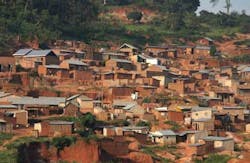Uganda’s first refinery expected to start operations by 2018
Uganda expects its first oil refinery to start operations by 2018, according to the Ministry of Energy and Mineral Development. The facility will have an initial capacity of 30,000 barrels per day, the aim being to reach 60,000 barrels by 2020, the Wall Street Journal reports.
The refinery project is part of Uganda's attempt to develop its recently discovered oil deposits so that it can reduce its imports and ultimately meet demand through domestic production. The discovery of commercial oil reserves was made in 2006 but their development has proved a painfully slow process. This is partly the result of disagreements between the government and oil exploration companies, which have been arguing over the development plans and refining arrangements, the WSJ said.
The refinery will be built in the Kabaale parish of Hoima district's Buseruka sub county, which puts it about 130 miles west of Kampala, the capital of Uganda. The cost of the project is estimated at $2 billion.
This project has been among the most contentious points in the drawn-out debate over Uganda's development strategy for its oil reserves, which are estimated at some 3.5 billion barrels of crude. For almost two years, the government and oil companies were caught in a stalemate but some progress was made in April. The government agreed then to greenlight plans for a smaller refinery close to a crude oil export pipeline to Kenya's north coast. In July, China National Offshore Oil Corporation (CNOOC) expressed interest in investing, doing so days after Uganda's government said that it would use future oil revenues to pay Chinese companies for infrastructure projects.
RELATED: Canadian refineries ramp up crude exports from US
CNOOC, Tullow Oil of the UK and French-based Total are working together as joint venture partners to develop the oil deposits in the Lake Albertine Rift basin. So far, the Chinese group is the only member of the trio to indicate interest in the refinery project. Tullow announced in July that the joint venture partners had achieved "substantial progress" in their talks with the government and expected to execute a memorandum of understanding for development of the oil fields. Meanwhile, the government is being advised by U.S.-based Taylor-DeJongh over the choice of lead refinery investor, financing sources and the establishment of a refining company, the newspaper added.
Among the controversies surrounding Uganda's first refinery is the issue of compensation for the 7,000 or so people that will be affected by the project. According to local weekly The Observer, residents are complaining that they are being offered "peanuts." The government has set aside 78 billion shillings ($30.5 million) and most families will get between 40 million shillings and 100 million shillings. While many people are content with the amount offered per acre of land, they protest that the compensation mechanism does not take into account crops and other properties on the land. When everything is considered, the rates are highly inadequate. The affected people also point out that prices have gone up in the interim and this has not been reflected in the compensation rates. But one of the greatest concerns is their alleged coercion into signing receipts without having actually collected any money, the newspaper said.
